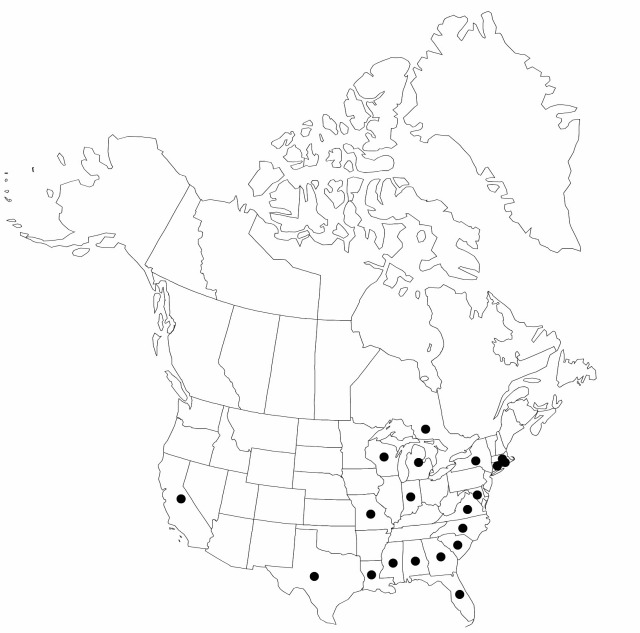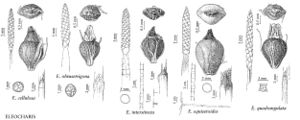Eleocharis equisetoides
Ann. Lyceum Nat. Hist. New York 3: 296. 1836.
Plants perennial; rhizomes 2–4 mm thick, soft to firm, longer internodes 2–8 cm, scales persistent, 7–8 mm, membranous, tubers absent. Culms terete, 50–100 cm × 5–8.4 mm, soft to firm, obscurely to clearly septate-nodulose throughout, internally hollow with complete transverse septa, closer together near the spikelet; plants never forming filiform, flaccid culms. Leaves: distal leaf sheaths persistent, membranous to thinly papery, apex acute to slightly acuminate. Spikelets not proliferous, 20–45 × 4–5(–8) mm; rachilla joints bearing prominent winglike remnants of floral scales; proximal scale empty, amplexicaulous, (2–)2.8–4.9 mm; floral scales 85–160, 1–3 per mm of rachilla, stramineous to pale brown, usually with pale to dark brown submarginal band, obovate to oblong, (4.8–)5.2–7 × 3–4.4 mm, cartilaginous, often membranous toward margins, margins broadly translucent, membranous, apex rounded to obtuse. Flowers: perianth bristles 3–8, stramineous to reddish, slender, vestigial to 2.5 mm, shorter than to equaling achene, smooth or obscurely retrorsely spinulose; anthers stramineous to red-striated, 2.6–3.2 mm; styles 2–3-fid. Achenes yellowish to reddish brown, obovoid, biconvex to obscurely compressed trigonous, 1.8–2.3 × 1.4–1.9 mm, obscurely sculptured or sometimes partially smooth at 10–15X, each face with 20–40 rows of linear, transversely elongated cells, lines separating cells obscure, apex with very short neck 0.6–0.8 mm wide. Tubercles dark brown, lamelliform, high-deltoid, 0.6–1.1 × 0.5–0.7 mm.
Phenology: Fruiting late spring–late fall.
Habitat: Fresh ponds, lakes, marshes, streams, ditches, cypress swamps
Elevation: 10–500 m
Distribution

Ont., Ala., Calif., Conn., Fla., Ga., Ind., La., Md., Mass., Mich., Miss., Mo., N.Y., N.C., R.I., S.C., Tex., Va., Wis.
Discussion
We have not seen voucher specimens for reports of Eleocharis equistoides from Arkansas and Tennessee. It is probably extirpated from Illinois, Missouri, and Wisconsin.
Contrary to previous decriptions, sectioning of the culm reveals that the distance between the septa near the spikelet cannot be used to distinguish the two septate species, E. equisetoides and E. interstincta, which when achenes are absent are better distinguished by the septate-nodulose distal parts of the culms of E. equisetiodes.
Selected References
None.
